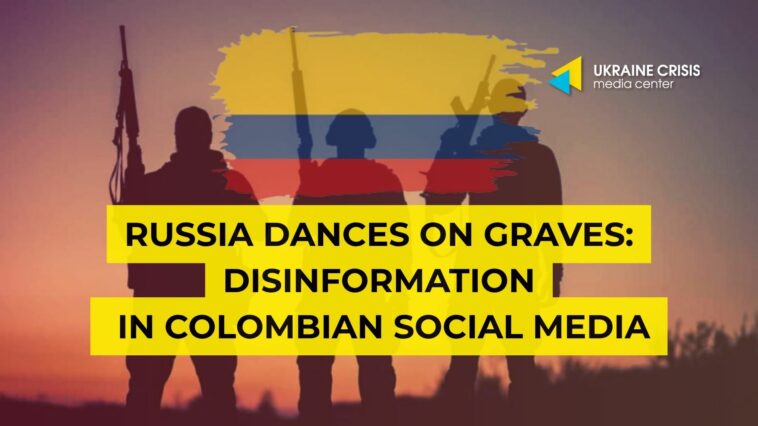In early June this year, pro-Russian sources began to spread allegations that Ukraine refuses to accept and repatriate the bodies of fallen soldiers from Russia.
In the international dimension of pro-Kremlin propaganda, a distinct focus was placed on the topic of foreign volunteers. In particular, the Spanish-language information space has been filled with the narrative that Ukraine is ‘hiding or even destroying’ the bodies of Colombians who fought in the Ukrainian Defence Forces in order to avoid paying the compensation to their families.
This fake quickly spread through social media, where Russian propaganda adapted the message to different audiences. The disinformation was especially active in the Latin American segment of social media in an attempt to undermine trust in Ukraine among potential volunteers and their families.
For example, videos were posted on TikTok that voiced the fake in Spanish, sometimes accompanied by news footage or comments. The captions to such videos directly stated: “The bodies of several Colombian soldiers killed at the front were handed over by Russia, but Kyiv refuses to take them. Everything points to the fact that the reason is payment evasion.” This text went viral: it can be seen in many TikTok videos from June 2025 on the topic of Colombian volunteers.

Some videos have provocative titles such as «Colombia buries bodies, Ukraine receives medals», which reinforce the emotional colouring of the lies. It is not uncommon for the authors of the videos to refer to alleged ‘testimonies’ or news taken out of context. For example, fragments of Russian TV reports about Colombian mercenaries have appeared on TikTok with subtitles or voiceovers in Spanish. Such reactionary videos present propaganda statements as fait accompli: on the screen, there is footage of battles or interviews, while a commentator in Spanish says that Ukraine «refuses to return the dead». The comments under these videos show that some viewers took the fake at face value, outraged that «the Ukrainian government is abandoning even foreigners».
Pro-Russian Telegram channels spread this narrative even more aggressively. Immediately after the Istanbul agreements (early June), a number of Z-channels with a large audience began publishing posts stating that «Kyiv refused to take 6,000 bodies of fallen soldiers because it did not want to pay their families». In addition to text posts, fake screenshots of Western media were circulating on Telegram. On 9 June, several pro-Kremlin channels shared a fake screenshot of a «Politico article» with a blatant headline about «40,000 bodies of Ukrainian soldiers as an attack on Ukraine’s economy». No reputable media outlet had ever written anything like that – it was a complete fabrication. Similarly, a fake with the Wall Street Journal logo was circulated about an ‘order’ not to accept bodies without compensation.

Significantly, Russian propaganda has been promoting the «Colombian mercenaries» issue since the end of 2024. Sputnik Mundo released a report in which a Ukrainian prisoner said that «in Kharkiv, the crematorium is not able to cope, the bodies are burned in mobile ovens in order to avoid paying compensation to the families». The same news item mentioned that some relatives of the Colombian volunteers who died complained that they had not received the promised payments, and that information about the fate of the bodies was being concealed, allegedly to avoid compensation. This narrative moved smoothly into 2025, and when real details began to emerge – the deaths of Colombians in the war, difficulties with the identification and repatriation of their remains – Russian channels used this as «proof» of their fictions. In fact, according to the Colombian Foreign Ministry, released in February 2025, a total of 64 Colombian citizens have been killed in Ukraine since the beginning of the Russian invasion. Of these, 57 bodies were repatriated to their homeland, 1 was buried in Ukraine, and 6 were in the process of being returned as of the end of March.
Despite official data that refuted Russian claims, the propaganda machine continued to promote fake narratives through various channels and platforms. RT’s videos emphasised that Ukraine had allegedly «abandoned» foreigners who had fought for it. For example, in April 2025, former RT journalist Inna Afinogenova released an investigation on YouTube entitled «Mercenarios de Colombia en Ukraine: Así los Reclutan para Morir» («Colombian mercenaries in Ukraine: How they are recruited to die»), which received hundreds of thousands of views. It claimed that Colombian veterans are lured by high salaries and then left to fend for themselves at the front. Although Afinogenova is not an official Kremlin spokesperson, her materials actually complement Russia’s disinformation campaign aimed at the Spanish-speaking audience. They form an image of Ukraine as a state that uses «mercenaries» and does not value their lives.

(«Colombian mercenaries in Ukraine: How they are recruited to die»)
Ukraine strongly denied Russian claims of «refusal to accept bodies». The Coordination Headquarters under the Ministry of Reintegration and the state news agency Ukrinform denied these fakes, calling them manipulations of the sensitive issue of the return of the dead. The Ukrainian military and the Centre for Countering Disinformation stressed that this PSYOP is aimed at undermining trust in the government and dividing society.
It is noteworthy that no accusations against Ukraine were made by the Colombian authorities.
The analysis of this disinformation campaign demonstrates a typical Russian propaganda strategy: using human tragedies (caused by Moscow’s actions) to spread fakes through messages adapted to different audiences. Fact-checkers and independent media have unanimously refuted these claims, confirming that Ukraine consistently returns the remains of its defenders, including foreign volunteers, whenever possible. Possible delays in repatriation are solely due to the objective difficulties of the war, and not to attempts to evade social obligations to the families of the deceased.
Mykyta Kuzmenko



